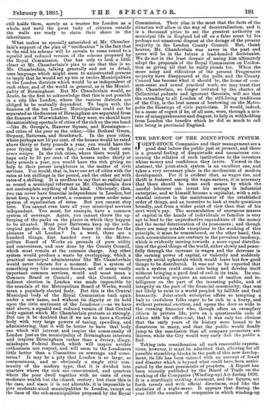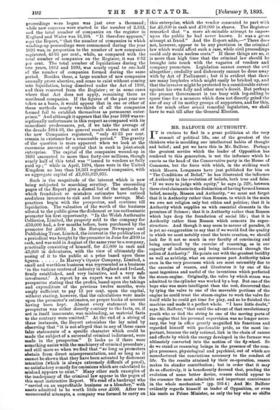THE DRY-ROT OF THE JOINT-STOCK SYSTEM.
jOINT-STOCK Companies and their management are a good deal before the public just at present, and there is a general feeling of disquietude and uneasiness con- cerning the relation of such institutions to the investors whose money and confidence they invite. Viewed in the abstract, the joint-stock system is an excellent one, and takes a very necessary place in the mechanism of modern development. For it is evident that, as wages rise, and thrift is fostered among the wage-earners, it is necessary that there should be some such means by which the careful labourer can invest his savings in industrial( enterprise, and so himself become a capitalist, with a sub- stantial interest in the maintenance of the established order of things, and an incentive to look at trade questions broadly, and from a wider point of view than that of his next week's pay. The accumulation of enormous masses of capital in the hands of individuals or families is very apt to lead to the unproductive expenditure of the money and the moral deterioration of its possessors ; and though there are many notable exceptions to the working of this principle, it must be remembered, on the other hand, that such accumulations are contrary to the prevalent tendency, which is evidently moving towards a more equal distribu- tion of the good things of the world, either slowly and peace- fully through the increase in wages and the decrease in the earning power of capital, or violently and suddenly through social upheavals which would leave but few good things to be distributed. It was not to be expected that such a system could come into being and develop itself without bringing a good deal of evil in its train. Its suc- cessful working requires an amount of caution and in- telligence on the part of the investing public, and of integrity on the part of the financial community, that was not likely to exist in a world peopled by fallible and frail humanity. Joint-stock enterprise offers so tempting a bait to credulous folks eager to be rich in a hurry, and without personal exertion, and opens the door so wide to the cunning financier who, though often an exemplary citizen in private life, puts on a questionable code of ethics with his office-coat, that it was only too obvious that the early years of its history were bound to be disastrous to many, and that the public would finally jump to the conclusion that all company promoters are thieves, while the City would very early dub the public a fool.
Taking into consideration all such reasonable expecta- tions, however, it must be admitted that, allowing for all possible stumbling-blocks in the path of this new develop- ment, its life has been tainted with an amount of fraud and disaster which is beyond what could have been antici- pated by the most pessimistic of prophets. A Report has been recently published by the Board of Trade on the working of the Companies (Winding-up) Act during 1893. It is a startlingly striking document, and the figures, set forth tersely and with official directness, read like the statistics of a night-mare. It appears that during the year 1893 the number of companies in which winding-up proceedings were begun was just over a thousand ; while new concerns were started to the number of 2,332, and the total number of companies on the register in England and Wales was 16,104. "It therefore appears," tys the Report, "that the number of companies in which winding-up proceedings were commenced during the year 1893 was, in proportion to the number of new companies registered, 43 65 per cent., while, as compared with the total number of companies on the Register, it was 6-32 per cent. The total number of liquidations during the two years, 1892 and 1893, was nearly equal to one-half of the number of companies formed during the same period. Besides these, a large number of new companies annually prove abortive' and cease to exist without coming into liquidation, being dissolved under the Act of 1880, and thus removed from the Register ; or in some cases where that Act does not apply, remaining there as moribund companies. If the figures of the past year are taken as a basis, it would appear that in one or other of these methods nearly two-thirds of all the companies formed fail to establish themselves as permanent enter- prises." And although it appears that the year 1893 was ex- ceptionally unfortunate in this respect as compared with its immediate predecessors, yet, if we take the average of the decade 1884-93, the general result shows that out of the new Companies registered, "only 43.33 per cent. remain in existence for a reasonable period." The gravity of the question is more apparent when we look at the enormous amount of capital that is sunk in joint-stock enterprise. The capital of the companies wound-up in 1893 amounted to more than forty-one millions, though nearly half of this total was "issued to vendors as fully paid up ; " while in April, 1894, there were in the -United Kingdom no less than 18,361 registered companies, with an aggregate capital of £1,035,029,835.
Such is the magnitude of the interest which is now being subjected to searching scrutiny. The succeeding pages of the Report give a dismal list of the methods by which fraudulent or mistaken estimates have enticed credulous investors to risk and lose their savings. Mal- practices begin with the prospectus, and continue till liquidation. The valuation of the worth of the business offered to the public gives the dishonest or too enthusiastic promoter his first opportunity. "In the Welsh Anthracite Collieries, Limited, the property sold to the company for £50,000 had, a few months before, been purchased by the promoter for £600. In the European Newspaper and Publishing Trust, Limited, the interest in the publication of a periodical was bought by the promoter in June for £300 in cash, and was sold in August of the same year to a company, practically consisting of himself, for £5,000 in cash and £5,000 in debentures, with the view of ultimately dis- posing of it to the public at a price based upon these figures In Harvey's Oyster Company, Limited, a small and worthless business was represented as a business in the various centres of industry in England and Ireland, firmly established, and very lucrative, and a very safe investment.' A report by an expert was set out in the prospectus stating that the profits, based upon the takings and expenditure of the previous twelve months, were amply sufficient to pay 15 per cent. upon the capital, without stating, however, that the calculations were made upon the promoter's estimates, no proper books of account having been kept. Almost every statement in the prospectus was either directly contrary to the facts, or, if not in itself inaccurate, was misleading, as material facts to the contrary were omitted." At the end of a string of these instances, the Report astonishes the lay mind by observing that "it is not alleged that in any of these cases false statements of a specific character which could be made the subject of a successful criminal indictment, were made in the prospectus." It looks as if there were something amiss with the machinery of criminal procedure ; and still more so when we find that "so long as promoters abstain from direct misrepresentation, and so long as it cannot be shown that they have been actuated by dishonest intention (which is always extremely difficult of proof), no satisfactory remedy for omissions which are calculated to mislead appears to exist." Many other such examples of the inadequacy of the criminal law appearin the pages of Ibis most instructive Report. We of a bankrupt who "carried on an unprofitable business as a bleacher,' with assets admitted to be worth little over £500. After two unsuccessful attempts, a company was formed. to carry on this enterprise, which the vendor consented to part with for £5,000 in cash and .210,000 in shares. The Registrar remarked that "a more abominable attempt to impose upon the public he had never known. It was a gross attempt at fraud." And the Report adds,—" There does not, however, appear to be any provision in the criminal law which would affect such a case, while civil proceedings could only mean useless costs." If these things are so, it is more than high time that the criminal law should be brought into touch with the vagaries of vendors and company promoters. Legislation cannot correct the evil altogether ; credulity and dishonesty cannot be done away with by Act of Parliament ; but it is evident that there are many loopholes which might easily be bricked up, and that the investor might be protected to a considerable extent against his own fully and other men's deceit. But perhaps the present Government is too busy with log-rolling to spare time for a measure which does not directly grind the axe of any of its motley groups of supporters, and for this, as for much other sound remedial legislation, we shall have to wait till after the General Election.







































 Previous page
Previous page